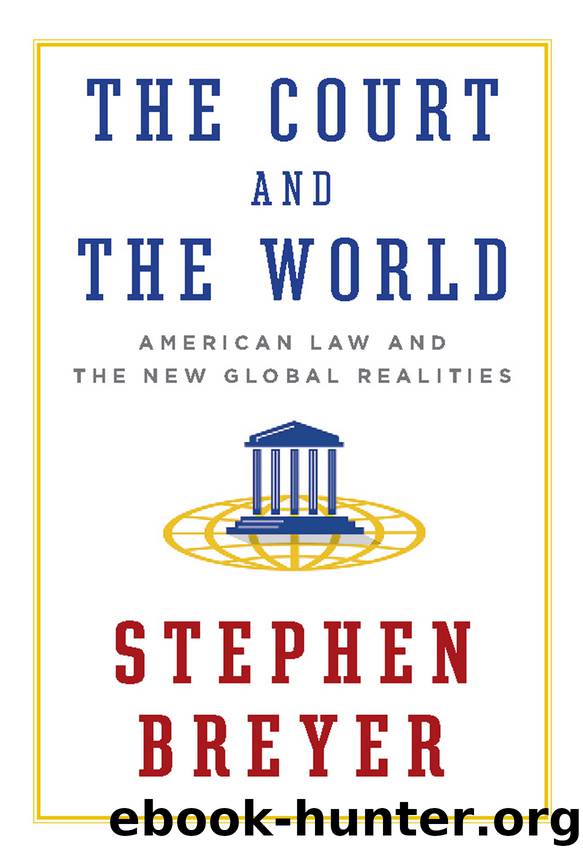The Court and the World by Stephen Breyer

Author:Stephen Breyer
Language: eng
Format: epub
Publisher: Knopf Doubleday Publishing Group
Published: 2015-09-15T04:00:00+00:00
THE TREATY
The Court’s application of domestic arbitration case law reflected, as I’ve said, arbitration law as it was developed in the labor arbitration field. But it was not obvious in BG Group that those doctrines should apply the same way. In the labor law area, strong reasons, having to do with the desirability of industrial peace, counsel in favor of granting considerable power to arbitrators. But the BG Group case was not a labor case. It involved a system of commercial arbitration created by a treaty among sovereign nations. Was it, then, right for the Court to adopt the same presumptions about what the parties likely intended as to who should decide what?
The solicitor general, presumably having consulted with the Department of State, had argued for the U.S. government that the answer was no. He said that the Court’s framework for resolving domestic arbitration disputes should be modified in the case of a bilateral investment treaty.51 The operative question, he said, should be whether preconditions to arbitration included in such a treaty—such as the local litigation requirement in Article 8—are conditions of the sovereign parties’ consent to arbitrate with an investor. If so, those provisions should be interpreted and applied by judges, not by arbitrators. That is because they concern the existence and validity of the agreement to arbitrate between a sovereign and a private party.52 The solicitor general did not say whether he thought the requirement was in fact a condition of Argentina or the United Kingdom’s consent. Rather, the government advocated that the Court vacate and remand the decision, sending the case back to the lower court to make that determination.53
The Court ultimately rejected the solicitor general’s view, applying the usual set of presumptions drawn from domestic arbitration case law to decide the treaty question. Even if “conditions of consent” in investment treaties should be spared the ordinary presumptions, and given de novo judicial review categorically, the Article 8 requirement was not such a condition.54 Rather, it was a purely procedural precondition, as the text and structure of the treaty suggested, nowhere calling it a “condition of consent.”55 Further, the treaty provided that the parties could refer a dispute to the International Centre for Settlement of Investment Disputes, or to the United Nations Commission on International Trade Law. And both of those organizations have rules that authorize an arbitration tribunal to be the judge of its own competence to decide an issue.56
Suppose, however, that the case had raised a different type of challenge to the use of arbitration. Imagine a case involving an investment treaty that explicitly referred to a precondition to arbitration as a “condition of consent.” Trade agreements with such language do exist. Before long our Court may have to decide whether to accept the solicitor general’s recommendation in such a case. It may have to determine whether treaties—given that sovereign nations are their signatories—deserve special treatment when they specifically include “conditions of consent” clauses. The Court in BG Group observed that the solicitor general had
Download
This site does not store any files on its server. We only index and link to content provided by other sites. Please contact the content providers to delete copyright contents if any and email us, we'll remove relevant links or contents immediately.
Objection! by Nancy Grace(1782)
Apeirogon by Colum McCann(1704)
Anatomy of Injustice by Raymond Bonner(1668)
That Every Man Be Armed by Stephen P. Halbrook(1582)
Civil Procedure (Aspen Casebooks) by Stephen C. Yeazell(1556)
The Vaccine Court by Rohde Wayne(1512)
Injustices by Ian Millhiser(1501)
Storytelling for Lawyers by Meyer Philip(1465)
A Practical Guide to International Arbitration in London by Hilary Heilbron(1441)
Restitution by Restitution(1427)
Coercing Virtue by Robert H. Bork(1360)
Broken Scales by Joel Cohen(1353)
Tangled Webs: How False Statements Are Undermining America: From Martha Stewart to Bernie Madoff by James B. Stewart(1339)
The Tools of Argument: How the Best Lawyers Think, Argue, and Win by Joel Trachtman(1318)
A Matter of Interpretation by Antonin Scalia(1316)
INDEFENSIBLE: One Lawyer's Journey Into the Inferno of American Justice by Feige David(1293)
American Tragedy by Lawrence Schiller & James Willwerth(1276)
A Religious Orgy in Tennessee by H.L. Mencken(1255)
Tangled Webs by James B. Stewart(1248)
